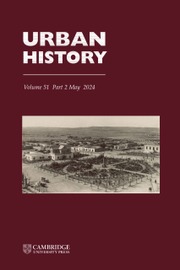No CrossRef data available.
Article contents
The paradoxes of urbanization: Belgian socialism and society in the belle epoque1
Published online by Cambridge University Press: 09 February 2009
Extract
Although small and consequently often overlooked, Belgium none the less provides historians with an interesting case study for comparing social and economic trends among Western European countries. Belgian society in the nineteenth century was transformed by the same forces as its close neighbours – Britain, France and Germany. Indeed, Belgium was the second country in the world to industrialize and it has long been one of the most heavily urbanized societies as well. Yet urbanization and industrialization affected Belgium in some significantly different ways than they did other Western European countries.
- Type
- Research Article
- Information
- Copyright
- Copyright © Cambridge University Press 1989
Footnotes
Based on Claude Desama, (ed.), 1885/1985. Du parti ouvrier au parti socialiste, Brussels, 1985, 421pp.
Marcel Liebman, Les socialistes belge, 1885–1914, Brussels, 1979, 299pp.
André Mommen, De Belgische Werkliendenpartij, 1880–1914, Ghent, 1980, 260pp.
Jean Neuville, Naissance et croissance du syndicalisme. L'origine des premiers syndicate, Brussels, 1979, 391pp.
Jean Neuville, L'évolution des relations industrielles. L'avènement du systeme des relations collectives, Brussels, 1976, 426pp.
Harry Van Velthoven, De Vlaamse Kwestie, 1830–1914. Macht en Onmacht van de Vlaamsgezindheden, Kortrijk, 1982, 369pp.
Karel Van Isacker, Mijn Land in de Kering, 1830–1980. vol. I. En ouderwetsewereld 1830–1914, Antwerp and Amsterdam, 1976, 271pp.
References
Notes
2 The most accessible general accounts of Belgian socialism are in Landauer, Carl, European Socialism, 2 vols (Berkeley and Los Angeles, 1959), I, 450–81Google Scholar and Reberioux, Madelaine, ‘Le socialisme beige de 1871 à 1914’, in Droz, Jacques, ed., Histoire générale du socialisme, 3 vols (Paris, 1974), II, 321–31.Google Scholar The treatment in Cole, G.D.H., A History of Socialist Thought, vol. IIIGoogle Scholar, Part II, ‘The Socialist International, 1889–1914’ (London, 1956), 617–55Google Scholar, is weaker as an interpretation of the party, but still useful for its information.
3 Joll, James, The Second International, 1889–1914 (London, 1955), 97, 122, 152–3, 171;Google Scholar Strikwerda, Carl, ‘Regionalism and Internationalism: The Working Class Movement in the Nord and the Belgian Connection, 1871–1914’, Proceedings of the Western Society for French History, 12 (1984), 221–30;Google Scholar Schneer, Jonathan, Ben Tillett (Urbana, 1982), 113–4;Google Scholar Strikwerda, Carl, ‘Urban Structure, Religion, and Language: Belgian Workers, 1880–1914’, (University of Michigan, Ph.D. diss., 1983), 126, 218, 286–7;Google Scholar Rosa Luxemburg's criticisms of the Belgians is covered in Liebman, op. cit., 141–4, 180–2.
4 Rowntree, B. Seebohm, Land and Labour: Lessons from Belgium (London, 1911), 407;Google Scholar Velde, Emile Vander, La cooperation neutre et la cooperation socialiste (Brussels, 1913), 206–10.Google Scholar
5 A good survey of the Belgian socialists' attempts to gain pure universal suffrage (for males at least) is Renard, Claude, La conquete du suffrage universel en Belgique (Brussels, 1966).Google Scholar Mommen sees the comparison with Germany, but does not draw on work done on the German socialist movement extensively, 257.
6 Comparisons between miners' politics in Western European countries are, unfortunately, only beginning to be developed. A good start is Michel, Joel, ‘Politique syndicate et conjuncture économique: la limitation de la production de charbon chez les mineurs européens au XIXe siècle’, Le mouvement social, 119, (1982).Google Scholar Michel finds the British and Belgian miners the most similar since they both were in slowly growing industries by the First World War, as opposed to the Germans in the Ruhr and the French in the Pas-de-Calais.
7 Dupriez, Leon, ‘Local Government in Belgium’, American Political Science Review, 14 (1920);CrossRefGoogle Scholar Constance Keitel, A., Unemployment Insurance in Belgium: A National Development of the Ghent and Liege Systems (New York, 1932).Google Scholar
8 For this formulation as a way to define how ‘reformist’ socialists could still be distinguished from other democratic groups, see Patch, William, Christian Trade Unions in the Weimar Republic, 1918–1923 (New Haven, 1985), 231–2.CrossRefGoogle Scholar
9 Some of the most objective historical work on the Flemish questions is in English: Clough, Shepard, A History of the Flemish Movement in Belgium (New York, 1930);Google Scholar Zolberg, Aristide, ‘The Making of Flemings and Wallons: Belgium, 1830–1914’, Journal of Interdisciplinary History, 4 (1974).Google Scholar
10 Jeanneny, Jean-Marcel, Le commerce en detail en Europe occidentale (Paris, 1954), 62–8.Google Scholar One of the few studies of modern Belgian urbanization in English is Vollans, E.C., ‘Urban Development in Belgium since 1830’, in Beckinsale, R.P. and Houstion, J.M., eds, Urbanization and Its Problems (Oxford, 1966).Google Scholar
11 Belgium, , Ministère des affaires économiques, Démographie de la Belgique de 1921 à 1939 (Brussels, 1945), 260.Google Scholar
12 ommen uses two articles by R.Q. Gray as his model for attributing ‘petty bourgeois’ attitudes to the skilled workers who founded the socialist party in Brussels, but it does not seem that he has actually studied these workers, Mommen, op. cit., 257.
13 ‘Le commerce de detail’, Bulletin (de Banque Nationale de Belgique), 15 (1938), 511.Google Scholar
14 Patch, op. cit., 228; Kater, Michael H., The Nazi Party (Cambridge, Mass., 1983), 36.Google Scholar




